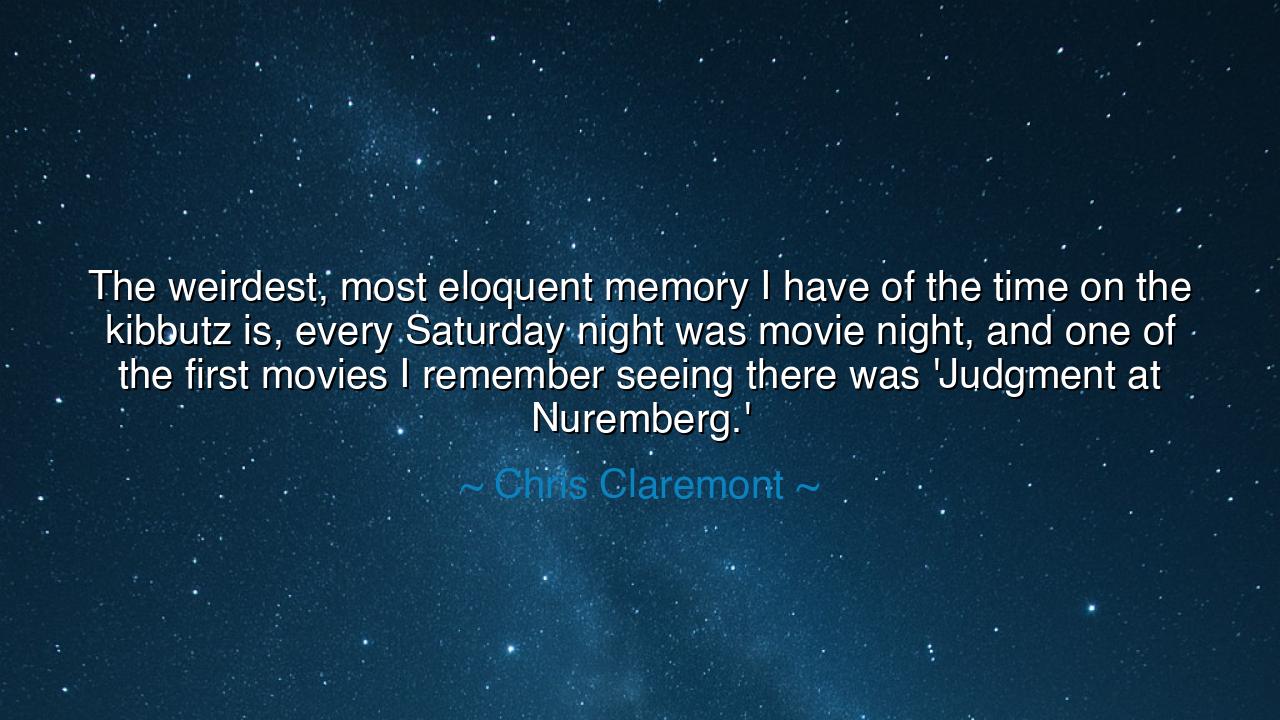
The weirdest, most eloquent memory I have of the time on the
The weirdest, most eloquent memory I have of the time on the kibbutz is, every Saturday night was movie night, and one of the first movies I remember seeing there was 'Judgment at Nuremberg.'






Hear the words of Chris Claremont, whose reflection on his time in the kibbutz brings forth a memory both poignant and filled with meaning: “The weirdest, most eloquent memory I have of the time on the kibbutz is, every Saturday night was movie night, and one of the first movies I remember seeing there was ‘Judgment at Nuremberg.’” In these words, Claremont unveils the power of film not just as entertainment, but as a gateway to understanding the complexities of humanity, morality, and justice. To view a film like Judgment at Nuremberg—a stark portrayal of the post-war trials of Nazi officials—is to witness the weight of history and the depth of consequences for actions that reverberate through time. But it is also to experience a moment of reflection in the midst of daily life, as films serve as both a mirror and a window into the soul of society.
In the ancient world, the great philosophers and historians understood the power of stories to shape our understanding of the world. Consider Herodotus, the father of history, who sought not just to record events but to explore the human condition through those events. He understood that stories of war, betrayal, and justice could teach us lessons that would transcend the generations. Just as Herodotus wove the tales of empires and their rise and fall, so too does Claremont recognize that films like Judgment at Nuremberg serve as more than just stories—they are lessons that demand reflection on the moral choices made by individuals and societies. The kibbutz, in this sense, becomes not just a place of work and community, but a sanctuary for the examination of deep, existential truths through the power of cinema.
Consider, too, the great Greek tragedians, who wrote of fate, morality, and the consequences of human actions. Sophocles, in his play Antigone, wrote of the tension between divine law and human law, a theme that echoed throughout the ages and has been revisited by countless thinkers and creators. Judgment at Nuremberg, like Antigone, confronts the idea of moral duty in the face of authority. The film depicts a tribunal where the accused are not just criminals, but those who carried out atrocities under the guise of duty and obedience. This mirrors the struggles of the ancients—to reconcile personal responsibility with the commands of the larger society. For Claremont, the experience of watching such a film during his time in the kibbutz was not just an escape into entertainment, but a deeply transformative experience that offered a window into the soul of justice.
In the modern world, the lessons of Nuremberg and the moral challenges they present continue to be relevant. Think of the Nuremberg Trials themselves, held in the aftermath of World War II, when the world sought to hold individuals accountable for the atrocities of war. These trials, though focused on the crimes of a particular time and place, were an attempt to reckon with the human capacity for evil and to establish a moral framework that could prevent such horrors in the future. Claremont’s memory of watching the film about those trials is a reminder that the fight for justice is ongoing—that it is not something settled in the past but a struggle that must be engaged with continually, even in the quiet moments of personal reflection.
Claremont’s experience at the kibbutz also highlights the power of community in shaping our understanding of justice and morality. The kibbutz, a collective where work and life are shared, becomes a place of introspection, where even the simplest activities—such as watching a movie—become an opportunity to confront larger questions about life, history, and human behavior. In the communal space of the kibbutz, Claremont found not only the time for physical labor but the mental and emotional space to wrestle with the great questions of the day. Movies became a means of engaging with those questions, offering a powerful counterpoint to the physicality of work with the intellectual and emotional engagement of art.
From Claremont’s memory, we learn a profound lesson: art, in all its forms, has the power to transform us, to awaken us to truths about ourselves and our world. Movies, in particular, have the unique ability to hold a mirror to society, to force us to confront uncomfortable truths about our past and present. Whether it is through a historical drama like Judgment at Nuremberg or a more personal story, film has the power to move us beyond mere entertainment and into the realm of moral reflection. Claremont’s experience teaches us that sometimes, the most profound lessons come not through lectures or books, but through the shared experience of storytelling, where we are invited to reflect on the consequences of human actions.
Therefore, O future generations, let Claremont’s reflection on his time in the kibbutz remind you of the power of story to shape not only your understanding of the world, but also your place in it. Just as the ancients used storytelling to pass down wisdom, so too must you engage with the stories of today. Let them challenge you, provoke you, and guide you toward a deeper understanding of morality, justice, and human responsibility. Whether it is in the form of a movie, a book, or a conversation, remember that each story has the potential to teach you something vital about the world and your role in it. Like Claremont, embrace the opportunity to learn from the experiences of others, and in doing so, build a future that is shaped by the wisdom of the past.






AAdministratorAdministrator
Welcome, honored guests. Please leave a comment, we will respond soon